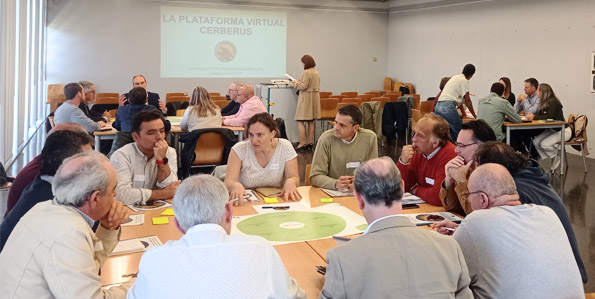CERBERUS Project
The UPV leads the development of an intelligent system to reduce the use of pesticides and control six key pests in Mediterranean agriculture.
[ 24/04/2024 ]
The Universitat Politècnica de València (UPV), through its Agricultural Robotics Laboratory, is leading the development of an intelligent system to reduce the use of pesticides and eradicate six key pests in Mediterranean agriculture. This is the fundamental objective of the international CERBERUS project, coordinated by the UPV, whose partners are meeting today at the Vera campus.
"Currently, pest surveillance involves costly and time-consuming field visits and is not entirely efficient. There is an urgent need for new systems to detect them early and on a large scale and to act as quickly as possible to prevent their spread. In this sense, our project focuses on the early detection of pests and intelligent applications with variable spray doses according to prescription maps in order to reduce the use of pesticides and achieve sustainable eradication of pests in the early stages," says Francisco Rovira, director of the Agricultural Robotics Laboratory at the UPV and coordinator of the project.
To this end, CERBERUS proposes the development of a digital platform that, based on information from different sources, will generate risk maps and spraying recommendations for users through the application of artificial intelligence algorithms.
"The platform will collect data both from satellite observation models of large crops and from insect traps connected to it in the cloud, as well as data recorded by different agricultural monitoring robots in the vicinity, information provided by farmers and even by citizens themselves, by including citizen science in the project. And with all this data, processed by algorithms, it will help protect the fields from the main pests that threaten Mediterranean agriculture today," says Verónica Saiz, a researcher at the Agricultural Robotics Laboratory of the Polytechnic University of Valencia.
The CERBERUS system will be validated for three quarantine pests (F. dorée, X. fastidiosa, B. dorsalis) and three commonly treated pests (L. botrana, B. oleae, C. capitata), as well as for the three most critical woody crops in the Mediterranean: vineyards for wine, orchards for olive oil and citrus groves.
"Our goal is to provide the sector - from the small farmer to the official phytosanitary services - with a new and advanced monitoring system that will help sustainably protect these crops, with early detection of pests and intelligent action that takes advantage of all that AI and other technologies have to offer," concludes Francisco Rovira.
The CERBERUS project, funded by the European Union through the Horizon Europe programme, brings together 13 partners from Spain, Cyprus, Slovenia, and Italy, as well as from the academic and research world and the agricultural and administrative sectors. It started last January and will end in December 2027.
Outstanding news
 ARWU 2023
ARWU 2023
The Shanghai ranking reaffirms the UPV as the best polytechnic in Spain for yet another year
 Science Meets Regions CV 2023
Science Meets Regions CV 2023
The UPV and the Almussafes City Council begin a collaboration in search of solutions to maintain the automobile sector in the Valencia Region
 Scientific reference
Scientific reference
Avelino Corma, Distinguished Research Assistant at the UPV, awarded an Honorary Doctorate by the University of Huelva
 Micronanofabs NTC UPV-PERTE CHIP Conference
Micronanofabs NTC UPV-PERTE CHIP Conference
María Marced, TSMC Europe president: "The sector's future is bright, the market is expected to double by 2030"
 Goya nomination
Goya nomination
Javier Polo, who holds a degree in Audiovisual Communication from the UPV, directs the successful short documentary Una terapia de mierda
 Sant Carles Medal 2023
Sant Carles Medal 2023
The Faculty of Fine Arts of the UPV awards the Sant Carles Medal 2023 to outstanding Valencian art and culture figures





